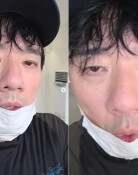Seouls Tibet

If you learn about death, youll learn about life.
These words are the core teachings of the Tibetan Book of the Dead, a sacred book that was written by the Buddhist mogul Padmasambhava in the 8th Century and since then was hidden in the caves of the Himalayas to be discovered again by followers. The people of Tibet believed that at the moment of death, just hearing those words from this book could free them from the clutches of life and death.
In the exhibition room on the ground floor of the newly renovated Hwajeong Museum in Pyeongchang-dong, Jongno-gu, Seoul, to be open to all on May 30, you can see the manuscript of the ancient Tibetan Book of the Dead. It was made in the usual way for Tibetan scriptures: overwritten in black ink on deep blue paper.
The Hwajeong Museum was founded by the president of Hahn Cultural Foundation Han Gwang-ho and specializes in Asian art. The museum houses over 2500 Tibetan Buddhist art pieces and Asian art treasures that he has collected over 40 years. It opened in 1999 in Itaewon, Seoul, but went into construction in 2004 to expand the display area and reopened just now. In commemoration, the Through Asian Eyes exhibition has opened and will be shown until August 30 for free. Its a great chance to get a taste of the Tibetan mentality and culture without traveling afar.
On the ground floor a drawing of a palm and the sole of a foot called Sonam Gyatso: Dalai Lama the Third, as well as Green Tara Bodhisattva that was believed to have been made from tears, other Buddhist artifacts like the Tibetan Buddhist painting Tangka are on display. This collection is especially world renowned for the quality and quantity of the Tangka.
On the first floor, Korean, Chinese, and Japanese paintings and craftwork are on display. Lee Jeongs Mukjukdo, Kang Se-hwas Jirakwado, and a temple bell from the Goryeo Dynasty can be seen in the Korea Room. The Moon Jar that was bought from The British Museum by funds from the Hahn Cultural Foundation was borrowed and will be on display for a month. The museum is closed on Mondays. For more information, call 02-2287-2994 or visit www.hjmuseum.org.
Mi-Seok Koh mskoh119@donga.com




![[김순덕의 도발] ‘李부터 연임’ 개헌, 이 대통령은 가능성을 말했다](https://dimg.donga.com/c/138/175/90/1/wps/NEWS/IMAGE/2026/01/16/133172656.1.jpg)

![“설거지해도 그대로”…냄비 ‘무지개 얼룩’ 5분 해결법 [알쓸톡]](https://dimg.donga.com/c/138/175/90/1/wps/NEWS/IMAGE/2026/01/15/133164664.3.png)
